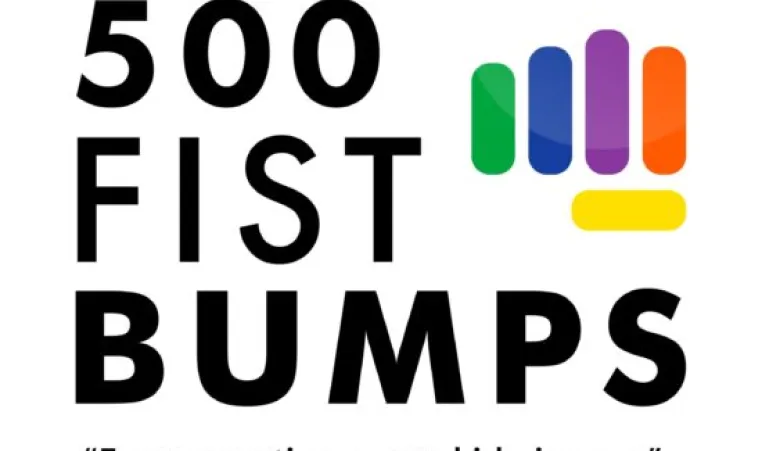
This fall the YMCA of Greensboro launched 500 Fist Bumps—a public health initiative delivered through youth and recreational sports programs—at its Mary Perry Ragsdale Family YMCA; the Y plans to roll the initiative out association wide in 2024.
Dr. Mike Perko, a professor of public health education at UNC-Greensboro’s School of Health and Human Services, and Dr. Stephen Hebard, a Licensed Clinical Mental Health Counselor, created the initiative using fist bumps as intentional connection points for children to help build trust, support and confidence. Perko says every fist bump is an opportunity to connect with a kid who might be lonely, anxious, or just needs to feel seen.
The power of this positive touch can also reduce stress, lower blood pressure, and help create feelings of trust that can lead to better mental health and well-being. After the Greensboro Y pilots this initiative, Perko and Hebard hope to expand the initiative to other NC YMCAs and youth sports organizations. This video highlights the program underway at the Ragsdale Y.
The premise is simple. At each practice, camp, or activity, every child receives multiple fist bumps from coaches and other players, whether they do something correctly or not. The goal is to reach 500 fist bumps at every activity to foster a positive culture and support for each child. Why 500? Because it’s hard. You have to work at it! That means everyone in the organization must commit (on the field, in writing, on your website, etc.) to prioritize connections with every child seeking community.
“We are proud to announce our wholehearted alignment with the '500 Fist Bumps' initiative,” said Marlee Rindal, Executive Director at the Ragsdale Y. “This initiative resonates deeply with the mission of the YMCA, as it emphasizes inclusivity, support, and the well-being of all individuals, perfectly reflecting our commitment to nurturing the potential of every child and fostering a sense of belonging within our community.”
The need for this type of effort is great for our youth. “If you have 20 kids on your team, two don’t know where their next hot meal is coming from, four are exposed to abuse in their home, five are not doing well in school, six are being bullied, 10 have depression and anxiety levels that put them at risk of having a diagnosable mental illness, and all 20 are going through active shooter training in schools, some since pre-K,” said Dr. Perko. “Coaches may see happy kids running around, but we need to really see what’s happening behind the scenes. And the fist bump is a powerful way to physically connect with kids to open communication.” Perko and Hebard say every kid today deserves to feel supported, seen, and acknowledged, and this can only happen when the entire organization commits to this initiative.
The Research and Outcomes
Dr. Perko said that the initiative is evidence-informed, bringing together half a century of research from the fields of tactile gestures, community health promotion, and youth sports best practices. “We’re not formally counting fist bumps, but there’s so much power in physical touch. We know that after only five fist bumps, our brains begin to produce oxytocin, a hormone that helps promote positive feelings. After 300 fist bumps, the hormones dopamine and serotonin are released. These help to create feelings of safety and security, and a greater sense of coping. And after 500 fist bumps, the brain's insular cortex (the part of the brain that makes us feel consciousness) is engaged; this helps generate feelings of safety, security, and trust. Quite literally, a sense of community has been created, and when our kids are feeling that way, they are going to be happier and healthier, even,” Dr. Perko said.
He also said partners like the Y, and others, are helping to measure outcomes. “500 Fist Bumps is our response to the U.S. Surgeon General's advisory on the healing effects of social connection and community. While we aren't measuring brain chemistry changes, we can measure feelings of social support, connectedness, and isolation, and tell the stories of how families are developing better health through their communities, and we are also getting feedback from parents, coaches, referees—everyone involved in youth sports,” Perko continued.
“Most importantly, we believe that not only does every child deserve this, but 10 to 15 years from now, when they are the parents, teachers, and coaches in our communities, this will become the norm and every kid in that community can truly feel that they belong,” Perko said.
Learn more about 500 Fist Bumps at this UNCG article or check out their website at 500fistbumps.org and read this article.